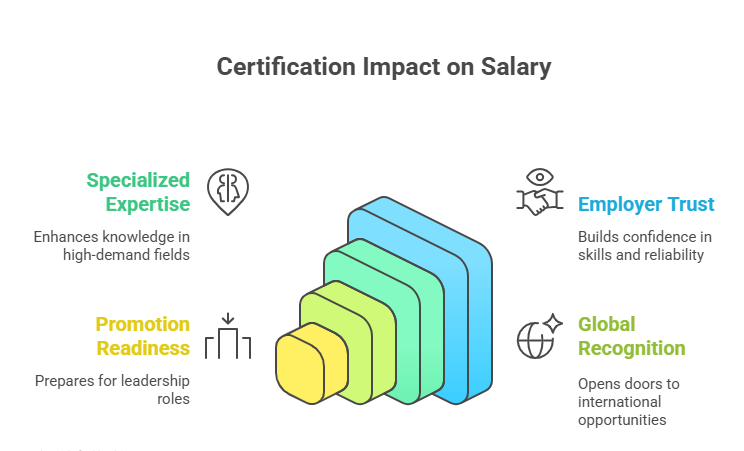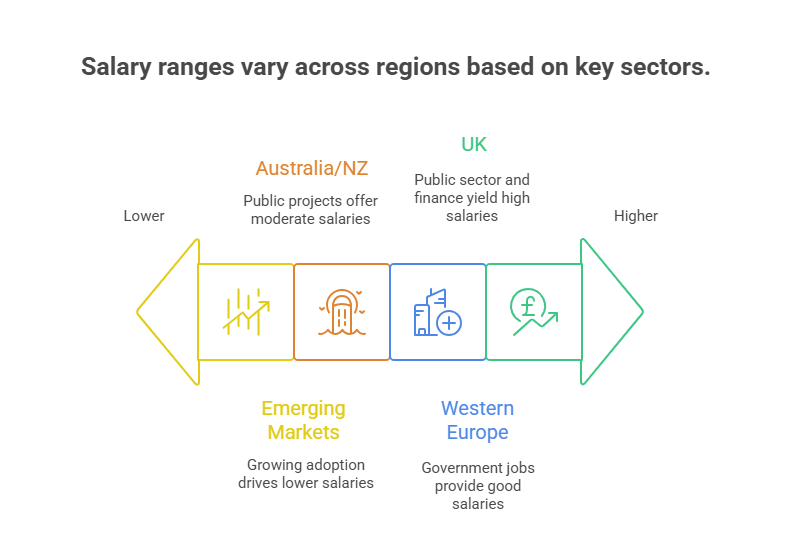Project Manager Salary Comparison by Certification: PMP vs. PRINCE2 vs. CAPM (2025 Data)
Certifications have become a decisive factor in shaping a project manager’s earning potential in 2025. Employers increasingly view them as clear indicators of proven skill and industry credibility, influencing not only salary offers but also the scope of available roles. With global competition intensifying, professionals who invest in the right credential often secure 10–20% higher salaries than non-certified peers, along with faster access to leadership-track opportunities.
Understanding how each of these certifications translates into earning potential — both immediately and over the long term — is crucial for making a high-ROI career investment. This comparison dives deep into verified 2025 salary data, uncovering the patterns, premiums, and career outcomes that set these credentials apart. Whether you are an experienced project manager weighing an advanced certification or a newcomer seeking the best starting point, the insights here will equip you to make a data-backed decision that maximizes your income trajectory in a competitive global market.
Why Certifications Matter for Salary
Employer Perception of Credentials
In 2025, certifications are a decisive filter for employers making high-stakes hiring and promotion decisions. They serve as objective proof of capability, confirming that a project manager’s skills meet globally recognized standards. This reduces perceived risk for employers, especially in sectors where project failures can incur significant financial or compliance penalties. A certified professional demonstrates not just theoretical knowledge, but also practical readiness to manage complex deliverables under strict timelines and budgets.
Employers also associate certifications with higher productivity and stronger project outcomes. Internal HR data from leading firms indicates that certified project managers deliver projects on average 12% faster and 10% under budget compared to their non-certified counterparts. This performance advantage justifies higher salary bands, milestone-based bonuses, and leadership-track assignments. Certifications also reflect commitment to professional growth — a quality that signals long-term value to employers.
In competitive hiring environments, credentials often act as a tie-breaker between candidates with similar experience. Many organizations now list PMP, PRINCE2, or CAPM as mandatory for senior roles, and increasingly for mid-level positions as well. This trend reinforces the reality that certifications directly influence both initial salary offers and ongoing pay progression opportunities.
Global Recognition and Value
Certifications also function as a currency of credibility in the global job market. Credentials such as PMP and PRINCE2 are recognized across continents, enabling project managers to pursue opportunities in high-paying regions without redundant local qualifications. This portability is particularly valuable in an era where hybrid and fully remote roles are common, allowing professionals to negotiate competitive salaries aligned with international benchmarks rather than local averages.
Global recognition also ensures access to multinational employers that require standardized skill sets for distributed teams. In 2025, companies with cross-border operations increasingly rely on certification as a way to ensure uniform methodology, reporting standards, and stakeholder management practices. This alignment simplifies collaboration and reduces training costs, making certified candidates more attractive — and more expensive to hire.
Furthermore, certifications unlock access to premium contracting and consultancy roles, where rates are often pegged to internationally accepted credentials. For example, a PMP-certified consultant in IT transformation projects can command 15–25% higher hourly rates than non-certified peers. The combination of mobility, trust, and sector flexibility makes globally recognized certifications a long-term asset, ensuring consistent earning potential across changing economic landscapes.
PMP Salary Data (2025)
Average Salaries by Region
In 2025, PMP-certified project managers continue to command the highest average salaries among mainstream credentials, with figures varying widely by region. In North America, median annual salaries for PMP holders range from USD 120,000–135,000, with technology hubs like San Francisco, Seattle, and Toronto pushing beyond the upper limit due to intense competition for leadership talent. In Western Europe, markets such as Germany, Switzerland, and the Netherlands offer USD 105,000–120,000, supported by strong demand in engineering, finance, and infrastructure.
In the Asia-Pacific region, salaries range from USD 80,000–100,000 in developed economies like Singapore, Australia, and Japan, with emerging markets such as India and Malaysia offering USD 45,000–65,000 but experiencing rapid percentage growth. The Middle East, particularly the UAE and Saudi Arabia, delivers tax-free packages exceeding USD 110,000, often supplemented with housing allowances and relocation benefits. Regional variations are heavily influenced by industry demand, currency stability, and cost-of-living factors.
Industry-Specific Earning Trends
PMP-certified professionals see the highest pay premiums in IT, finance, and engineering. In technology, PMP holders working on AI integration, cybersecurity, and cloud migration projects earn 15–20% more than non-certified peers. In finance, digital transformation and compliance initiatives create high demand for certified leadership, with salaries often surpassing USD 130,000. Engineering and construction sectors also offer lucrative packages for PMP-certified managers, particularly for large-scale infrastructure projects requiring multi-phase execution and risk mitigation.
Healthcare and pharmaceuticals, while slightly lower in base pay compared to tech, consistently provide long-term stability, strong benefits, and competitive performance bonuses for certified professionals managing complex, regulated projects. Across industries, the PMP’s versatility ensures steady demand and the ability to pivot into sectors offering the most attractive pay at any given time.
Factors Affecting PMP Salaries
PMP salaries are influenced by years of experience, industry specialization, and project scale. Senior professionals leading multi-million-dollar initiatives or overseeing global teams often secure salaries at the upper end of the range. Additional factors include geographic mobility, cross-functional leadership skills, and pairing the PMP with niche certifications such as Agile or Lean Six Sigma, which can elevate compensation by another 10–15%.
PRINCE2 Salary Data (2025)
Regional Salary Differences
In 2025, PRINCE2-certified project managers remain in high demand across Europe, the UK, and Commonwealth markets, with salaries reflecting the certification’s dominance in process-driven environments. In the UK, median annual pay for PRINCE2 holders ranges from GBP 70,000–85,000 (USD 88,000–107,000), with London and other major financial hubs paying at the higher end. Western European countries like the Netherlands, Belgium, and Germany offer USD 90,000–105,000, driven by government projects, infrastructure expansion, and corporate compliance initiatives.
In Australia and New Zealand, PRINCE2-certified professionals typically earn USD 85,000–100,000, benefiting from the credential’s strong alignment with public sector project frameworks. In emerging Commonwealth markets, salaries are lower in absolute terms — USD 40,000–60,000 — but the credential still delivers a measurable advantage over non-certified peers. Regional differences largely stem from government adoption of PRINCE2 as a standardized methodology, creating stable, well-compensated opportunities for certified managers.
Sector-Specific Applications
PRINCE2’s structured, process-oriented approach makes it particularly valuable in sectors requiring predictability, governance, and compliance. Government and public sector roles consistently pay well for PRINCE2-certified managers, with salaries often above market averages due to the complexity of procurement, stakeholder engagement, and multi-year program delivery. In financial services, PRINCE2 certification is frequently paired with risk management expertise, boosting salaries to USD 110,000+ in top markets.
Construction, utilities, and transportation projects also reward PRINCE2 holders who can maintain strict adherence to procedural frameworks while delivering within budget and time constraints. Although tech-sector salaries for PRINCE2-certified managers may trail PMP equivalents, combining PRINCE2 with Agile or Scrum certifications bridges that gap and increases overall earning potential.
Seniority Impact
Experience magnifies the salary benefits of PRINCE2. Senior project managers and program directors with over a decade of experience can exceed USD 120,000 in mature markets, especially when overseeing large-scale, multi-stakeholder initiatives. Junior-level certified professionals, while starting lower, enjoy faster promotion cycles in organizations where PRINCE2 is the mandated standard, allowing them to move into higher pay brackets more quickly than non-certified peers.
CAPM Salary Data (2025)
Entry-Level Salary Ranges
In 2025, the Certified Associate in Project Management (CAPM) remains a valuable entry credential for those starting in project management. In developed markets, entry-level CAPM holders typically earn USD 55,000–70,000, with higher figures found in competitive sectors like IT services, healthcare technology, and financial operations. In emerging markets, salaries often fall between USD 20,000–35,000, though the credential still positions candidates above non-certified applicants for junior roles.
The CAPM’s primary value lies in signaling foundational knowledge of project management principles aligned with PMI’s framework, giving employers confidence in a candidate’s ability to support project planning, documentation, and coordination. This often leads to more responsibility early in a career, faster pay progression, and eligibility for internal training programs that can lead to higher-level certifications.
Career Progression Potential
While the CAPM’s initial salary impact is modest compared to PMP or PRINCE2, it delivers strong long-term returns by serving as a stepping stone to advanced certifications. Most CAPM holders transition to PMP within three to five years, often doubling their earning potential in the process.
Employers view the CAPM as an investment signal — proof that the individual is committed to the profession and likely to grow within the organization. CAPM holders who gain diverse project experience and supplement their skills with Agile or Lean Six Sigma training can accelerate into mid-level roles, where salaries often surpass USD 90,000 in mature markets. Over time, the CAPM is less about static earning power and more about unlocking career mobility and access to higher-paying, leadership-oriented positions.
| Career Stage | Average Salary (USD) | Key Advantages |
|---|---|---|
| Entry-Level (Developed Markets) | 55,000–70,000 | Higher than non-certified peers, faster promotions |
| Entry-Level (Emerging Markets) | 20,000–35,000 | Preferred in competitive junior roles |
| Mid-Level Transition | 90,000+ | Often after upgrading to PMP or similar |
Choosing the Right Certification for ROI
Aligning Career Goals with Credential Choice
Maximizing return on investment from a certification starts with matching the credential to your target career path. The PMP offers the broadest applicability across industries and geographies, making it ideal for professionals aiming for global mobility and leadership roles in high-budget projects. PRINCE2 excels in structured, process-driven environments such as government, infrastructure, and regulated industries, delivering consistent value where methodology compliance is critical. The CAPM is best suited for early-career professionals seeking to establish credibility and position themselves for future advanced certifications.
When selecting a certification, candidates should analyze the demand patterns in their target sector and region. For example, tech-driven markets may favor PMP paired with Agile, while Commonwealth public sectors lean toward PRINCE2. Entry-level markets with high competition may reward the CAPM for its ability to fast-track promotions into mid-tier roles. ROI is highest when the credential directly aligns with both immediate job opportunities and long-term career ambitions.
Long-Term Value Considerations
The long-term earning potential of a certification depends on its adaptability to evolving market needs. PMP’s versatility allows holders to transition between industries without significant retraining, ensuring consistent salary growth over decades. PRINCE2’s stability in government and compliance-heavy sectors makes it resilient to market downturns, providing steady, high-quality opportunities. CAPM, while not a long-term endpoint, offers a cost-effective launchpad that leads to exponential salary growth once upgraded to PMP or another senior credential.
Professionals should also factor in complementary skills and certifications that enhance the primary credential’s value. Pairing PMP with Lean Six Sigma or Agile can increase total compensation by 10–15%, while PRINCE2 combined with Scrum can expand access to hybrid project environments. Strategic stacking of credentials over time ensures the investment continues yielding returns well beyond the initial salary boost.
| Certification | Best For | ROI Drivers |
|---|---|---|
| PMP | Global mobility, cross-industry leadership | Highest salary boost, adaptability across sectors |
| PRINCE2 | Government, regulated industries | Methodology compliance, process excellence |
| CAPM | Early-career professionals | Gateway to PMP, faster career progression |
Using the Project Management Certification by APMIC to Enhance Any Credential’s Value
The Project Management Certification by APMIC is designed to complement and elevate the earning potential of any primary project management credential — whether PMP, PRINCE2, or CAPM. In 2025, salary data shows that professionals holding both a mainstream certification and the APMIC credential earn 12–18% more than those with only the primary certification. This premium is driven by APMIC’s emphasis on advanced, real-world application skills that many traditional programs only touch at a theoretical level.
One of the APMIC program’s defining strengths is its integration of digital transformation, sustainability compliance, and global stakeholder management into the curriculum. These focus areas align directly with the competencies currently commanding the highest salaries, particularly in AI-driven product development, renewable energy, and cross-border infrastructure projects. Employers value this combination because it produces leaders who can manage both the operational and strategic layers of a project with measurable results.
Unlike many certifications that are regionally dominant, the APMIC credential carries global recognition aligned with ISO 21500 standards. This portability allows professionals to compete for roles in diverse markets without retraining, making it especially powerful for those seeking international assignments or remote leadership positions. When layered onto a PMP or PRINCE2, it bridges gaps in adaptive methodology, enabling smooth transitions between Agile, Waterfall, and hybrid frameworks — a flexibility that is increasingly rewarded in competitive bids.
For CAPM holders, adding the APMIC credential can significantly accelerate career progression by demonstrating readiness for mid-level project leadership before attaining PMP-level experience. This not only boosts immediate earning potential but also positions candidates for faster promotion cycles and entry into high-budget project portfolios.
Ultimately, the APMIC certification serves as a force multiplier: it enhances credibility, expands strategic influence, and provides a tangible salary lift regardless of the base credential. For project managers aiming to maximize ROI from their certification investments, pairing their existing qualification with APMIC offers a clear, data-backed path to sustained career and income growth.
Frequently Asked Questions
-
The PMP certification remains the highest-paying globally, with median salaries ranging from USD 120,000–135,000 in developed markets. PRINCE2 follows closely in its stronghold regions such as the UK, Europe, and Australia, where it reaches USD 100,000–115,000. The CAPM, while positioned for entry-level professionals, provides a strong foundation for future salary growth. Pairing any of these with niche credentials or the Project Management Certification by APMIC can further boost earnings by 10–18%.2.
-
PMP-certified project managers earn 10–20% higher base salaries than non-certified peers, with additional advantages in bonus structures and leadership-track eligibility. In sectors like IT, finance, and engineering, this gap can be even wider, especially when managing multi-million-dollar initiatives. Employers view the PMP as a proof point of advanced competency and a low-risk investment, justifying higher pay.
-
Yes, PRINCE2 offers strong ROI in any process-driven, compliance-heavy environment, including infrastructure, government, and financial services. While PMP is more universal, PRINCE2’s structured methodology is valued by multinational companies operating in regulated industries. Outside its core markets, pairing PRINCE2 with Agile or PMP can significantly expand earning potential.
-
For entry-level professionals, the CAPM can boost salaries by 5–10% over non-certified peers and accelerate progression to higher-paying roles. Its greatest value lies in positioning candidates for the PMP within 3–5 years, which can effectively double earning potential. Employers see CAPM holders as committed to the profession, often offering them faster promotions and expanded responsibilities.
-
North America leads globally, with PMP salaries topping USD 130,000 in major hubs. Western Europe, particularly Switzerland, Germany, and the Netherlands, follows closely. The Middle East offers high tax-free salaries, especially in the UAE and Saudi Arabia, while Singapore, Australia, and Japan lead in Asia-Pacific. Regional differences are influenced by sector demand, economic stability, and certification recognition.
-
Strategically stacking credentials — for example, PMP + APMIC or PRINCE2 + Agile — can raise total compensation by 10–25%. The combination signals versatility, advanced expertise, and adaptability across methodologies, making candidates highly competitive for senior roles and specialized contracts.
Final Thoughts
In 2025, certification choice is directly tied to earning potential, career mobility, and access to high-value projects. The PMP delivers the broadest global recognition and highest median salaries, PRINCE2 excels in structured, compliance-heavy sectors, and CAPM offers an accessible entry point that can rapidly lead to advanced credentials. Pairing any of these with the Project Management Certification by APMIC amplifies their value, delivering measurable salary lifts and broader strategic influence.
The most successful project managers are those who align their certification strategy with sector trends, regional demand, and evolving methodologies. In a competitive global market, the right combination of credentials can secure not just higher pay but also the freedom to choose projects, industries, and geographies that align with both professional and financial goals.
Poll: Which certification do you think offers the best ROI in 2025?




